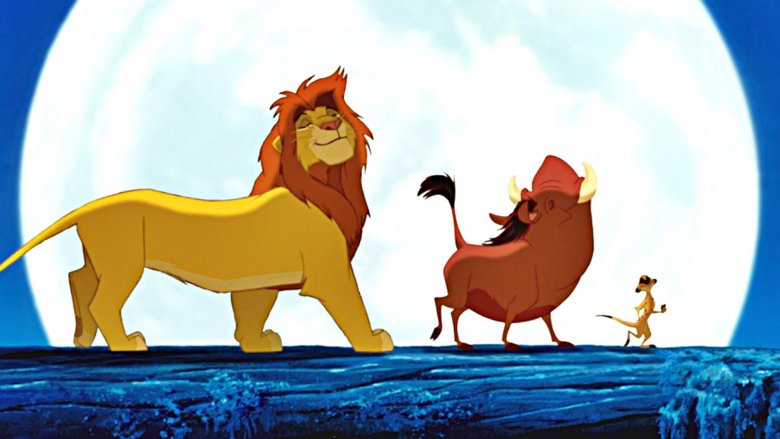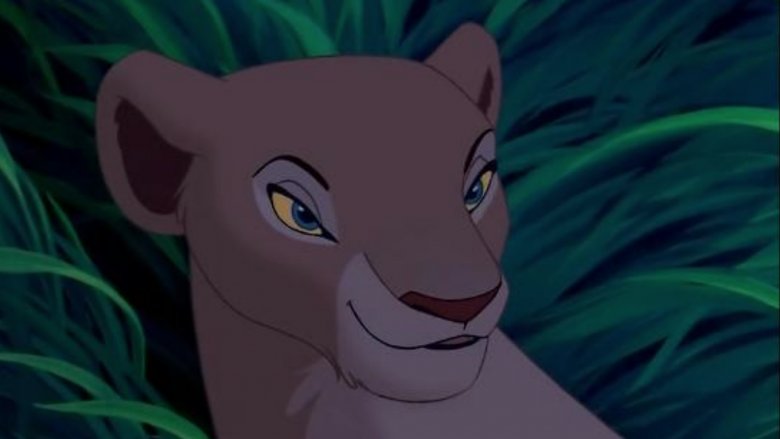Things In The Lion King Only Adults Notice
Hakuna Matata, what a wonderful phrase. Hakuna Matata, 'ain't no passing craze!
More than two decades after The Lion King hit theaters around the globe back in 1994, those two little words — or rather, that problem free philosophy — still resonates with fans, inspiring them to imagine how cool it would be to live life as a worry-less, jungle-dwelling soul. Because back then, when we were watching as kids, it kinda seemed like Simba led a pretty sweet existence — well, minus the whole dad being killed by his brother in a stampede thing, of course.
Re-watching this Disney classic as adults however, really hammers home how filled with woe Simba's life actually was. And while this movie will always be a beloved, beautifully animated, song-inducing, fun-fest, once you venture back to the Pride Lands today, things no longer seem as cute as they once did. Here are all the things only adults will notice in The Lion King.
Simba would have died in the desert
Believing himself responsible for Mufasa's death, Simba flees the Pride Lands on Scar's directions. He's chased by Shenzi, Banzai, and Ed — the main three hyenas — who are also following Scar's instructions: kill the cub and leave the pride open for Scar to rule. They follow Simba until he escapes them in a gorge, after which he's free to wallow in his misery. The following scene shows us his tiny, sleeping body in the midst of a vast, scorched desert; a victim of the brutal heat and the prey of an incoming gang of vultures — before, of course, being saved by Timon and Pumbaa. When we watched this scene as children, it was heartbreaking. Simba is innocent and it feels like everyone either hates him or wants him dead. He was just so sweet and so small and we just Could. Not. Deal.
This emotional reaction still stands as adults: Nobody wants to see a cute little lion cub without its family. But the bleak reality of adulthood also forces us to realize that this is the point that lovely Simba probably would have perished. Everything is against him: he's tiny, he's sleeping in direct desert sunlight, he's being attacked by a bunch of carnivorous birds and, as earlier scenes in the film illustrate, he has zero idea how to defend himself. Sorry, but the little dude would've been a total goner.
More than just roomies?
How much did you love Simba and Nala's partnership when you were a kid? How they grew up together; how she wept when he "died"; how they found each other again and created a family of their own? Their relationship was so sweet and vital to the storyline that we really rooted for them, and they held our attention — especially as they were the only real romance in The Lion King. But what if they weren't? What if there was another couple getting all Hakuna Matata in private — and we totally missed it?
Call us controversial, but what if Timon and Pumbaa were low key dating? And if not, why not? Consider the elements: There's a reason why the "opposites attract" stereotype is a thing, and this duo could not be more different — yet they're still super happy in each other's company. They love each other dearly — despite Timon's constant sassing and Pumbaa's constant gassing. They accept each other's flaws and roll with them, as any unconditional partnership should do. Also, how good are they as surrogate parents for Simba? Seriously. And you know it's not just coincidence that the cub's dancing, singing and mane-game gets so much stronger under their tutelage. Honestly, grown up Simba's hair could truly give Jonathan from Queer Eye (the new one, not the old one) a run for his money — it truly is the definition of luscious.
Plus their couple name would be Timbaa, and you know that's catchy as hell.
Cheetahs never prosper
Something we never realized when watching The Lion King — or any Disney film for that matter — were how many subtle jokes the writers slipped into the script as a little treat for the parents who were coerced into watching time and time again. Thankfully we've grown, and along with that growth has come the sweet gift of language, meaning that as adults we can get in on the jokes too. And that makes re-watching these movies all the more fun — especially when you realize how strong the writer's pun game is: The Lion King is stacked with word play.
Zazu, the sassy soul that he is, gets many of the best lines, with animal-related puns flying out of his beak faster than if they had wings. In one speech alone — above — he flits from (paraphrased) "baboons going ape" and "giraffes thinking they're above it all," to "elephants not being able to forget anything" and "cheetahs never prospering." It's honestly quite impressive, not to mention smart, and makes us love this posh parrot even more than we did already.
Where are all the African voices?
When you watched The Lion King as a child, chances are that you didn't pay much attention to how the film's characters are humanized — unless, of course, you were keeping an ear out for Jonathan Taylor Thomas' dulcet tones as baby Simba, because let's be real, who didn't have a crush on the dude back then? Nobody — that's who. Once you revisit as an adult though, this thought is kind of hard to avoid, and it begs the question: Where the heck are all the African accents?
Seriously though: Flick through the film's main characters and pay attention to their voices — Simba, Nala, Musafa, Timon and Pumbaa are all American. Scar and Zazu, for some inexplicable reason, are British. That's a pretty odd move considering the movie is set in Africa (most likely East Africa, as "Hakuna Matata is a Swahili phrase and the animators took inspiration from Tanzania) — and one doesn't usually find a bunch of Americans and Brits hanging around the savanna.
While it's still cool to recognize voices like JTT, Rowan Atkinson, Matthew Broderick and Whoopi Goldberg, it would have been much, much cooler had Disney included African accents in the mix, don't you think?
Scar's reign causes the apocalypse
Have you ever noticed how much the Pride Lands change once Musafa dies and Scar takes over? How it morphs from being luscious, life-filled and bountiful into some sort of post apocalyptic wasteland? Of course you have — this visual switch is so obvious you probably could have noticed it from inside the womb. But did you ever wonder how the heck that landscape change came about so quickly? As a child, probably not.
While it's certainly possible for a landscape to change drastically in a short space of time thanks to droughts, wildfires and the perils of climate change, how on earth could one lion be responsible for this? The film insinuates that Scar's reign is directly responsible for the devastated disaster zone that the Pride Lands become, that his deceit-ridden leadership caused some sort of ecological disaster — a disaster that is promptly fixed as soon as Simba takes the throne.
The move is an easy visual symbol that signifies the mood of the land, but let's be honest, it doesn't make any sense.
Simba could be on Jerry Springer
Hopefully you didn't spend huge chunks of your childhood binging on reality TV, wasting hours watching various family members trying to tear each other a new one — so it probably never occurred to you that Simba's life could have been lifted straight out of a particularly heinous episode of Jerry Springer. Because really, the drama this little lion had to deal with was next level nuts.
Let's break it down. Firstly, his father was murdered by his uncle. This same uncle then emotionally blackmailed Simba, framed him for the death, forced him to run away from home and tried to have him killed by three hyenas. Once Simba left the Pride Lands, nobody came to look for him, so he wound up living in the jungle being raised by a warthog and a meerkat, eating bugs and killing time. He's then visited by his dead father, goes back home and has a wild argument with his uncle while surrounded by blazing flames. Later, he shacks up and has a baby with a girl who, let's face it, is probably related to him. No, seriously.
What a hot mess, right? If this doesn't scream Jerry Springer fodder, nothing does.
Get it Gurl
While cloaked in the innocence of childhood, it's likely you didn't clock Nala's come-to-bed eyes and figure, "damn, girl, you sure know how to play a lion" — but we're certainly thinking that now! Seriously, there's a reason the above shot has become a meme — if Disney tries to claim that there aren't some intense sexual vibes pouring out of her eyelids, then you're a monkey's uncle.
Nala is one smart lioness, if you think about it. Okay, so let's push aside the fact they're betrothed or whatever and consider the facts: She has just stumbled upon the one hope the Pride Lands have to restore peace, and he's still hellbent on hanging around in the jungle with a meercat, a warthog, and a swamp load of bugs. Trying to reason with him clearly isn't going to work — Simba only listens to reason when hollered at by a mystical mandrill and the ghost of his dead father.
So Nala turns to the only weapon she can pull out on a whim: her femininity. And considering Simba not only ends up sprinting back to the homelands, but shacking up with her and creating a new cub for the Lands' to coo over, those eyes certainly did the trick!
Poor Zazu!
Surely being somewhat of a wiseacre didn't warrant the myriad of abuse that was launched at our feathered friend Zazu on the regular? When we were little, it's probable we witnessed the abuse he suffered with a sort of sardonic glee — after all, his enforcement of boring rules and regulations, his constant playing by the book, was an all too real reminder of the sort of crap we had to endure from our own parents and teachers on the daily. So of course we giggled when Scar tried to eat him — who wouldn't?
Now though, we genuinely feel sorry for him. Not only is his aforementioned pun game on point, but he's clearly just trying to be a good person and help everyone get along. Yet rather than being rewarded for his loyalty and dedication to Mufasa, Simba, and the Pride Lands, he's taunted mercilessly: he's used as target practice, is trapped in a cage and forced to sing, threatened with unemployment, and — as we already discussed — is treated as lunch. Give the bird some respect already!

